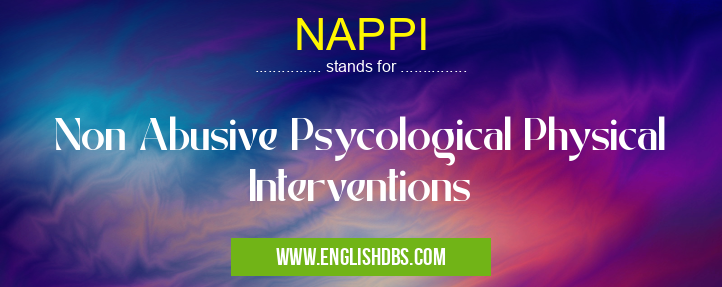What does NAPPI mean in UNCLASSIFIED
NAPPI is an acronym used to refer to a specific type of training designed to help professionals interact with individuals in a non-abusive way. This type of training emphasizes the use of positive, non-Physical forms of communication and interaction while minimizing physical contact. It is intended to help reduce the risk of abuse and increase safety for all involved.

NAPPI meaning in Unclassified in Miscellaneous
NAPPI mostly used in an acronym Unclassified in Category Miscellaneous that means Non Abusive Psycological Physical Interventions
Shorthand: NAPPI,
Full Form: Non Abusive Psycological Physical Interventions
For more information of "Non Abusive Psycological Physical Interventions", see the section below.
Essential Questions and Answers on Non Abusive Psycological Physical Interventions in "MISCELLANEOUS»UNFILED"
What is NAPPI?
NAPPI stands for Non Abusive Psychological Physical Interventions. It is a type of training that teaches professionals how to interact with individuals using positive, non-physical forms of communication and interaction while minimizing physical contact.
Who can benefit from NAPPI training?
All professionals working with vulnerable people have the potential to benefit from this type of training. This includes health care workers, mental health workers, social workers, teachers, law enforcement personnel and other professionals who work with individuals at risk for abuse or violence due to any variety of factors.
How does NAPPI Training help reduce the risk of abuse or violence?
By teaching professionals how to communicate effectively without resorting to verbal or physical aggression, it helps reduce the likelihood that these individuals will be subjected to abusive behavior in the first place. Additionally, learning techniques such as de-escalation and calming methods can help further minimize conflict in certain situations where tension may be high.
What kinds of techniques are taught during NAPPI Training?
Participants learn about effective communication techniques such as active listening, appropriate verbal responses using empathy statements, establishing consent and trust building measures. They also learn how to recognize warning signs when interaction may become violent or abusive as well as strategies for de-escalation if necessary.
Is there ongoing support available after completing NAPPI training?
Yes, participants are given access to ongoing support such as refresher courses or additional resources which they can access if needed. Ongoing consultation or advice can also be sought from certified trainers if needed in order to ensure that best practices are being adhered too when interacting with individuals being served by them.
Final Words:
NAFI provides an important service by increasing safety measures for vulnerable individuals through proper education and training on non-abusive psychological physical interventions (NAPPI). By equipping practitioners with skills such as appropriate verbal responses and de-escalation strategies they are better able to handle difficult conversations without escalating a situation further. Training courses continue to evolve over time but ultimately serve one very important purpose - prevention!
